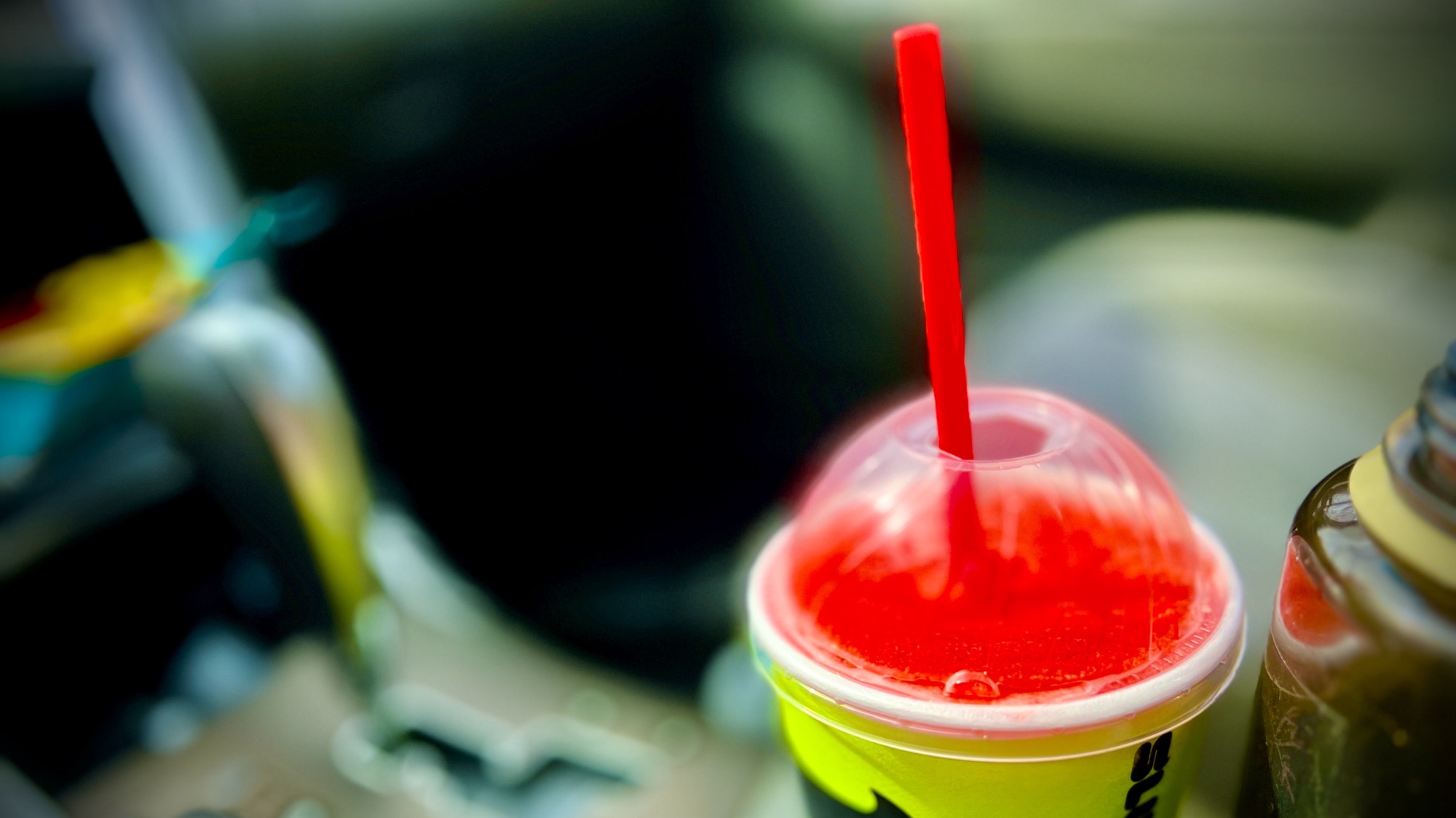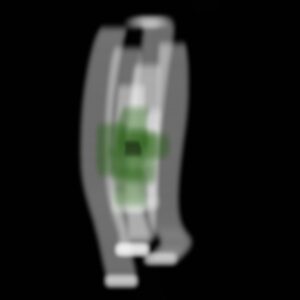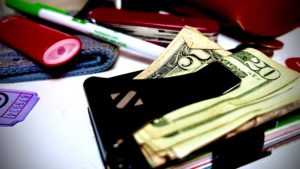I’ve time traveled to my local shopping mall in the 80s, I’m about to drink the first Slush Puppie I’ve had since I was a teenager, and all my cash is counterfeit because it hasn’t technically been printed yet, thought Fred Skeller, nose wrinkled in frustration.
He stared at his wallet. Not even an emergency quarter.
It was a thing, before cellphones, to have a coin—usually a quarter—tucked away to make an emergency call from a pay phone. He had always carried one in the front pocket of his book bag, and later, various duffel bags and backpacks through high school and even college. No longer, since pay phones had mostly gone the way of the telegraph station, the one-hour Photo Booth, and educational programming on the Discovery Channel.
He looked up for just a moment to see that the young peanut clerk was also looking at his wallet. She looked up. Their eyes met. Her expression had evolved from bored, to suspicious, to annoyed. He looked down again quickly.
No quarters, no change. Just plastic, and twenties, he thought. That’s… He stopped. That wasn’t it.
“Hang on,” he said. He didn’t dare look up.
He dug into the very middle section of his wallet, deep in the folds and creases, to a little hidden pocket—just the type of place you might squirrel away an emergency buck or two. Probing the darkest reaches with outstretched fingers, he felt something like soft paper; he pinched his fingers together like scissors, straining, trying to get a grip. At last, he pulled out a worn five-dollar bill of vintage design, the printing date indicating that it had been minted way back in the olden days of 1978. It was still legal tender in his day, and it was certainly legal tender in whatever year he was in now.
He held it out like a just-turned-21-year-old at a bar with a legal ID. “This should work better,” he said with a wide smile, which he quickly toned down to a friendly pursing of his lips.
The girl looked at the bill and paused a moment. Then, as Fred suspected, the desire to get back to reading about a Corey’s latest exploits won out over any remaining suspicion. She accepted the fiver without further comment.
The register clattered, the drawer banged open with a chingggg, and she handed him a dollar and some change. “Thankshavaniceday,” she said in a single breath, while turning and walking back to her magazine with a speed and urgency notably higher than that given to her actual paying job.
Teenage clerks, he half-grumbled, then turned introspective. I’m sure I wasn’t any better. Karma is real, he decided.
He turned his attention to the new object in front of him. A tall cup with a domed plastic lid rose from the counter, a bright red straw plunged off-center into a miniature neon snowbank. He shoved his wallet back into his pocket along with the change, then reached out his hand. He felt a shiver as he touched the cool, waxy paper, barely damp with condensation. He lifted the cup and took a deep pull on the straw.
Sometimes, he felt that nostalgia could elevate an otherwise ordinary or even subpar experience to an undeserved place on a mental pedestal. This was not one of those times.
To put it simply, Fred’s brain exploded.
There was the coldness of the ice, an acid tang and the vague taste of exotic fruits and other artificial flavors. His throat felt like a dry stream bed after a hundred-year drought, eagerly absorbing every drop of moisture as if it might never rain again. His mind turned suddenly to the past, to the dry heat of the three o’clock summer sun and a dusty dirt road underfoot, the wild echoing chorus of a guitar solo on a worn cassette tape played through cheap headphones, sunscreen and chlorine and the chemical smell of a new T-shirt, yet unlaundered. He felt the hard wood slats of a mall bench, the heavy rubber soles of canvas basketball shoes, the texture of fresh new asphalt beneath knobby bicycle tires, the burning metal of a seatbelt buckle on bare flesh, and the tickle of sparklers on the Fourth of July. Each was fleeting, like the fading memory of a dream; later, he would only be able to recall hints and flashes, and the fullness of the experience left him aching in its absence.
He jerked back to awareness; a much more boring part of his brain realized suddenly that he might be in the way of other customers, but, turning, he saw that no one else was in line. The clerk remained oblivious, immersed in Coreys. His temporary blackout hadn’t caused any problems.
Still sucking on the straw, he walked carefully across traffic and sat on one of the steps by the fountains.
This is just the beginning, he thought to himself. I’m here. I’m really here. I don’t know how or why, but somehow, I’m here, and I have the chance to see it all again. To do it all again!
He still didn’t fully understand the rules of this place, but so far, he’d been able to interact, to touch, even to taste. Money would be an issue—he was limited to just the change from the vintage fiver—but he wasn’t sure if he’d be able to take anything back with him anyway, whenever this all ended. Assuming it will end, he considered, a bit darkly. But let’s worry about that later, he thought, brightening.
The point was, there were plenty of things he could do at the mall without spending a dime. His childhood had been one long training session for that.
He began to formulate a plan. First, the toy store. Then, Radio Shack. Spencer’s next—the store still existed in his time, but the 80s version was classic and superior, he felt. And then, the guitar shop, the bookstore, the record store, and finally, the arcade. At least some of his change had come in quarters.
He watched the flow of people bustling back and forth on their errands; the mall was more vibrant and alive than he even remembered. It was mesmerizing. A boy tried to get around a show-moving cluster of yammering adults, who were ignorant of the importance of a firsthand look at the newest and shiniest Transformers. He felt a sudden urge to stand up, to grab the boy by his skateboard-chic T-shirt and shake him, to tell him how much worse it would be when this was all gone, when the crowds thinned and vanished, leaving only memories and echoes. To relish this. To appreciate it.
The boy could have been him, he realized. He remembered the torture of youthful impatience.
Useless. Some things could only be learned through experience.
The boy found his opening and darted ahead, disappearing into the crowd. Fred kept looking for a few moments more, then gave up.
He stood. It was time to explore the past.
As he stepped forward into a break in traffic, he sucked on the straw and found it blocked. A chunk of ice. The prime hazard of the Slush Puppie experience. He gave an extra-hard pull.
There was no flow of liquid for a long second, and then, before he could stop himself, the ice crumbled and a massive wash of frigid sugar water rushed across his tongue. The bitter cold sensation traveled across the roof of his mouth, to the top of his throat, to the very back of his sinus cavity.
He realized his mistake. He thought of the last time his foot had fallen asleep, of the brief period of comfortable numbness before the inevitable agony of pins and needles. There was nothing to be done, now. His eyes lit for just a moment on the bright yellow and red of the toy store’s illuminated sign, then screwed shut. For the second time in minutes, Fred’s head exploded, but this time, with the pain of a slush-induced brain freeze.
The crash of the fountains and the murmur of the crowd blended into a rushing noise that blocked out all other sounds. Still holding the cup, he released the straw from his lips and put both hands up to his nose and forehead, squinching up his nose and cheeks in an attempt to lessen the pain. Heedless of the people around him or his position in the crowd, he halted in place, waiting for the throbbing to subside.
And long moments later, the cold gave way to the warmth of blood rushing to his face, and he felt the pain begin to fade. The sound faded too, and he was left in silence.
Silence. No fountains. No footsteps. No buzz of indistinct conversation. No music. Just quiet.
He stood with his eyes still closed. The brain freeze was gone, but he had the sense that there was new pain waiting on the other side of his eyelids. Finally, reluctantly, he opened his eyes, and felt himself slipping back into melancholy.
The mall was empty again. The storefronts had returned to darkness and blank walls. He turned left, then right, then left again, but slowly, without panic. He blinked, and cocked his head to the side like a confused puppy.
There’s no real reason I should be confused, he thought. I’m just at the mall, the old mall, where most of the stores are gone, and so are the people. Just like it’s been for years. It was different once, but this is how it is now. This is how it will be.
There was a bench. There was no tree nearby, and no trash can—with or without an ashtray. He walked over to it and sat.
He felt a sensation of wet and cold. In slight surprise, he realized he was holding something. He looked at it in his hand, resting on the bench, then lifted it up to get a closer look. It was a waxy cup with a plastic dome, and a smiling cartoon dog on the front, and it was filled with slushy, brightly colored ice. There was a red straw.
After a pause, he put the straw into his mouth. He sipped. Bahama Mama, he thought.
“You’ll get stuck!”
He jumped. It was the old couple.
“Sorry?”
“I said, you gotta keep moving or you’ll get stuck!” said the man.
“Oh!” He gave a small laugh. “Right!” He took a tiny sip of the Slush Puppie and heard a slurping sound.
The woman squinted. “I didn’t know they still sold those here.”
Fred looked down at his cup. He noticed that most of the color—and the flavor—was gone, leaving just water-flavored slush. He looked back up. “It was the last one,” he said.
The woman nodded. “Well, nothing wrong with a treat now and then. Just not every day. That’s how you get to be this old!” She laughed, and so did the man.
Fred laughed too, for real this time. “I’ll take that advice!”
Fred sat for a moment more as he watched the pair walk away. He wondered if they remembered the Peanut Shack. Or if an impatient young man had ever tried to get around them, on his way to the toy store.
He stood. The walk back to the mall’s center court was faster this time. The space looked smaller, the route shorter. There seemed to be less to see, less detail. It wasn’t a hall of memories. It was just an old mall.
He didn’t look back as he headed towards the row of glass double doors. He dropped the mostly empty paper cup into a trash can with no ashtray.
“Bye-bye, Slush Puppie,” he said quietly.
He stepped through the inner door into the vestibule, then pushed open the outer door, feeling the outside air rush past him as he did. It smelled strangely fresh and clean, without a hint of cigarette smoke. He was already in the parking lot before the door slammed shut with a hiss and a chunk.
He didn’t hear it. The sun was shining and he felt light. The mall receded in the rearview mirror as he merged onto the highway, heading for somewhere new.



